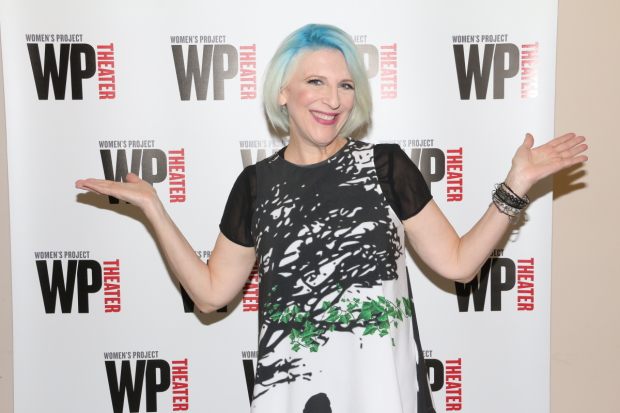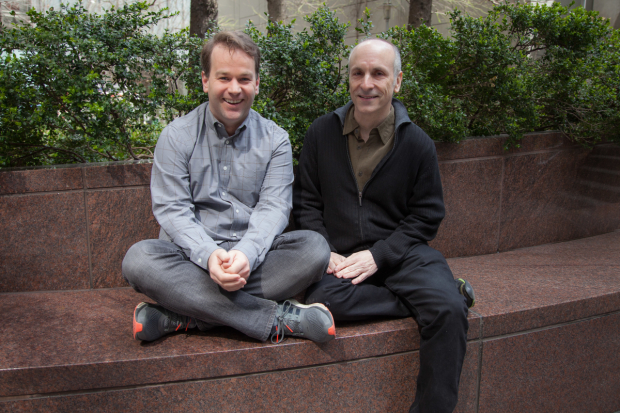Comedy Is Easy…Theater Is Hard

(© David Gordon)
"About six years ago, I was doing comedy on a Thursday night in Pittsfield, Massachusetts," the comedian Lisa Lampanelli remembers. "I've been playing pretty big places, fifteen hundred seats to Radio City, for ten to fifteen years. I'm in Pittsfield and it doesn't sell out. It felt very personal for some reason. I said to my husband — I was married at the time — 'I'm quitting comedy.' The very next day, I'm watching Carrie Fisher's one-person show on HBO, and I was like, 'I'm gonna do that. I can write a one-person show.'"
Known in the stand-up world as the "Queen of Mean," Lampanelli began collaborating with the writer Alan Zweibel, who guided Billy Crystal to the stage in 700 Sundays, and Tony-winning Urinetown director John Rando. But over time, she became dissatisfied with the solo-show form. "It wasn't saying enough universally on what my real interest is: women and food. It said a lot about me, but there are more women with different types of issues out there. Let me make this a real play, with four actresses and sets and lights and sounds and costumes, and really say something about women who struggle with similar stuff."
Lampanelli is one of many comics taking the stage this season on Broadway and off in new theatrical works. While Stuffed, her "comedy plus emotional moments," is a conventional play (running as a WP Theater production through November 6), her colleagues from the world of stand-up are using the various forms of theater to tell stories their own way.
"It's really an odd hybrid," Chris Gethard says of Career Suicide, his new comedy about, according to the show's tagline, "suicide, depression, alcoholism, and all the other funniest parts of life." Gethard hasn't been "calling it a play, but I find myself saying 'theater piece' a little more often." He developed it through standup, at venues like Union Hall in Brooklyn, "even though the subject material didn't lend itself to standup."
His reluctance to call it anything besides a piece of theater, stems from a basic fear of many of his peers: "Comedians tend to want to avoid anything that sounds pretentious, but I've had to get over that." It was only when his director, Kimberly Senior of Disgraced, and producer, Knocked Up writer-director Judd Apatow, got involved that Gethard's mind changed. "I kept saying I just want this to be funny. [Apatow] said, 'Dude, this isn't standup anymore. This is a one-man show. It's a different thing."

(photo courtesy of Chris Gethard)
The difference, Gethard notes, is that "stand-up audiences show up and they want to laugh. At clubs, when it's people out for a night on the town, they just want to have a couple of drinks and be taken to the laugh. For this show and this type of piece, it requires [audience members] who have a little bit more patience and are ready to sink their teeth into something that's more layered than traditional stand-up. When I start this show, I know from the very first line what the punch line is for the very last thing, and they have a lot to do with each other. There are a lot of things along the way that take you from Point A to Point B. Standup doesn't necessarily have that. Standup is a little more aggressive, lock and load, let's go out and get 'em."
A director's help in crafting these pieces has been immeasurable to these performers, who rarely work with a guiding hand in creating standup sets. "I thought a director just said 'Stand here, move here,'" Lampanelli notes. "I really didn't know they collaborate with you." With the help of Jackson Gay, Stuffed has undergone a fascinating transition. "We're doing tons of rewrites based on her observations and work. She helps streamline it and it worked out really nicely."
Gethard is thrilled that Senior, a longtime friend of his wife, came aboard Career Suicide. "Her fingerprints are all over the show now and it is much better for it. Right away, she was like, 'I'm not gonna tell you how to write the jokes, but trust me on the other stuff and this thing will get good. Her mind is built to see that stuff in a totally different way than my mind is."
In the case of Oh, Hello on Broadway at the Lyceum Theatre, Nick Kroll and John Mulaney's stage play featuring their popular septuagenarian characters Gil Faizon and George St. Geegland, director Alex Timbers helped them shape and hone a piece that they'd done nearly a dozen times before he came aboard for a 2015 off-Broadway engagement at the Cherry Lane Theatre.
"This sounds so crazy," Timbers remembers. "While we were in tech at the Cherry Lane, at night, they were doing performances of this show at UCB [Upright Citizens Brigade], midnight shows. [It was like] rehearsing a new number to put in a musical during the day but doing the old one at night. We were integrating all new stuff into their show, but they were performing with old sound cues and things at night. It was wild. But luckily, they're so fast on their feet that they were able to adapt to that."
What the writer/performers have all realized is that in the theatrical setting, going deep is more important than getting laughs. "The one-woman or one-man show that's just standup masked as theater, people see through it now," Lampanelli notes. "Billy Crystal was brave enough not to add a Muhammad Ali impression just because it's funny." It's better if "stand-ups can go deep, and usually they can, because stand-ups have a lot of stuff they've been hiding all these years."
"Playing it real," is what helped Mike Birbiglia and director Seth Barrish develop successful shows like Sleepwalk With Me and Thank God for Jokes, the latter of which goes on a cross-country tour this fall after an award-nominated run at the Lynn Redgrave Theater earlier this year. Finding the strength to create Sleepwalk With Me, Birbiglia's first theatrical venture, one that explored his story of jumping out of a second-story window while fast asleep, was about a particularly difficult experience to develop. "It actually pained me," Birbiglia told TheaterMania in April. "But instinctually as an artist, I'm going to have to go to the most extreme place and be the most vulnerable…In terms of talking about something that is life-threatening and making it funny, how do you do that? I venture to say that you play it real."
Gethard concurs. "I'm not aiming to do anything brave or profound, I just have my honest stories. When people come up to me and say, 'That was really funny, but it also triggered these other emotions,' that's a very impactful thing for me."

(© Seth Walters)











